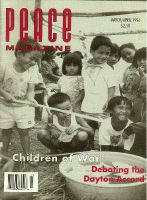
Peace Magazine Mar-Apr 1996, page 26. Some rights reserved.
Search for other articles by PMag staff here
The seven members of the Association of South East Asian States (ASEAN)--Brunei, Indonesia, Malaysia, Philippines, Singapore, Thailand, and Viet Nam--plus three other states in the region--Cambodia, Laos, and Myanmar--signed a treaty on December 15, 1995 to establish the region as a Nuclear Weapon Free Zone (NWFZ).
Malaysia's Prime Minister, Mahatir Mohamed, stressed that the Treaty should be seen as a move toward a global ban on nuclear weapons. The signing was overshadowed by U.S. unease over the Protocols to the Treaty, which would require the nuclear weapons states to provide assurances never to use or threaten to use nuclear weapons against its signatories. After further discussions between ASEAN and U.S. officials in January, the U.S. position was asserted again: that the protocols would have to be amended before the U.S. would sign.
On 11 January, U.S. Secretary of State Warren Christoher spoke with Russia's new Foreign Minister, Yevgeny Primakov. Both men reportedly stressed the importance of both the START II and the ABM Treaty. The U.S. Congress ratified START II on 26 January.
U.S. and Russian officials have been working on an agreement to permit testing and deployment of Ballistic Missile Defences against theatre range Ballistic missiles. However, the Republican Party advocated that the Defence Authorization Bill call for comprehensive coverage of the U.S. against ballistic missile attack by the year 2003--a provision that, if enacted, would almost certainly bring the ABM Treaty to an end. President Clinton therefore vetoed the bill. However, on 22 January, the bill was revised by the Congressional Conference seeking to reword it to the President's satisfaction.
The Chemical Weapons Convention, signed in January 1993, constitutes a permanent, total ban of all chemical weapons. For entry into force to take effect, 65 ratifications must be registered. Neither the U.S. nor Russia has ratified the treaty yet, but it is expected to enter into force within the next six months. The U.S. is destroying, by incinerating, parts of its stockpile of chemical weapons. Russia, which has expressed doubts about U.S. destruction techniques, is trying to store its own weapons, in preparation for their destruction, at an estimated cost of around ´Symbol not transcribed'3.5 billion, once the CWC takes effect.
Source: Newsletters from DFAX, University of Colorado.

Peace Magazine Mar-Apr 1996, page 26. Some rights reserved.
Search for other articles by PMag staff here